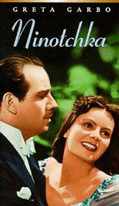
Directed by
Ernst Lubitsch
90 minutes
Rated PG
Reviewed by
Bernard Hemingway

Ninotchka
"Garbo Laughs!" was the famous sales pitch for Ninotchka. In 1939 that probably meant a lot to audiences who knew the actress as the brooding star of the silent era. Needless to say, this breakthrough is far less noteworthy today than it was then. Having said that, Garbo is actually still quite appealing. The issue is more the casting of the perennially avuncular Melvyn Douglas in the lead role, a role that required the panache of a Clark Gable or Cary Grant to carry off the fol-de-rol of a plot.
The story is set in Paris in the early 30s. Stalinist Russia is on its druthers and a trio of Russian delegates (Sig Rumann, Felix Bressart, and Alexander Granach) are sent to Paris to sell some jewellery, confiscated during the Revolution, for some quick cash. As it turns out Grand Duchess Swana (Ina Claire), who once owned the jewels is also in Paris and when she hears about it, sends her paramour Count Leon (Melvyn Douglas) to retrieve them. Before you can say “capitalist mire” the three are up to their necks in delights of consumerism. Moscow then dispatches Comrade Ninotchka (Garbo) to retrieve both the wayward delegates and the gems. Needless to say sparks fly between Ninotchka and Leon and the Soviet thaw begins.
Scripted by Charles Brackett, Billy Wilder and Walter Reisch and directed by the then acknowledged master of the sophisticated comedy, Ernst Lubitsch, Ninotchka is not without its charms although as a satire it is compromised by the political conditions of the time (it mocks Hitlerism but goes gentle on Stalin who was at the time being wooed by the Allies). The dialogue has its witty moments but Lubitsch fails to inject much life into proceedings and the film's "classic" staus notwithstanding, we are left with a few pleasant moments, notably an impressively-realised scene in which we understand the succumbing of the three apparatchiks to the delights of capitalism through the visits of room service to their door but without ever going beyond it. All that we ever hear are their gasps of delight. It's a brilliant scene but the rest of the film does not live up to it
Want something different?





